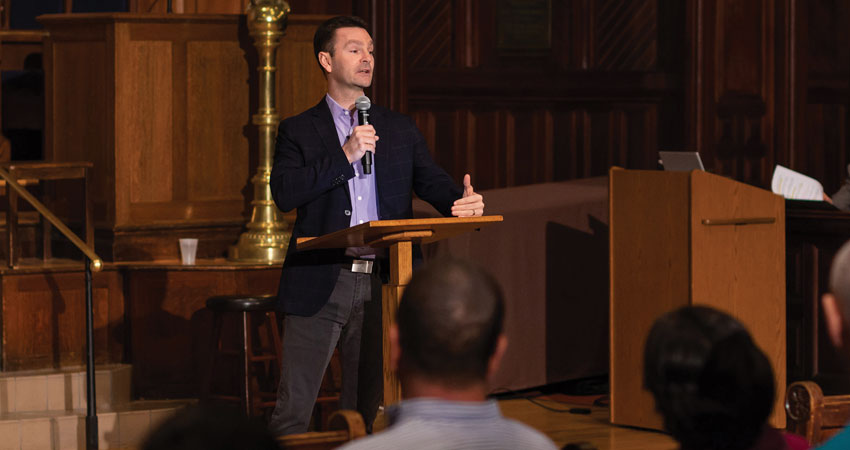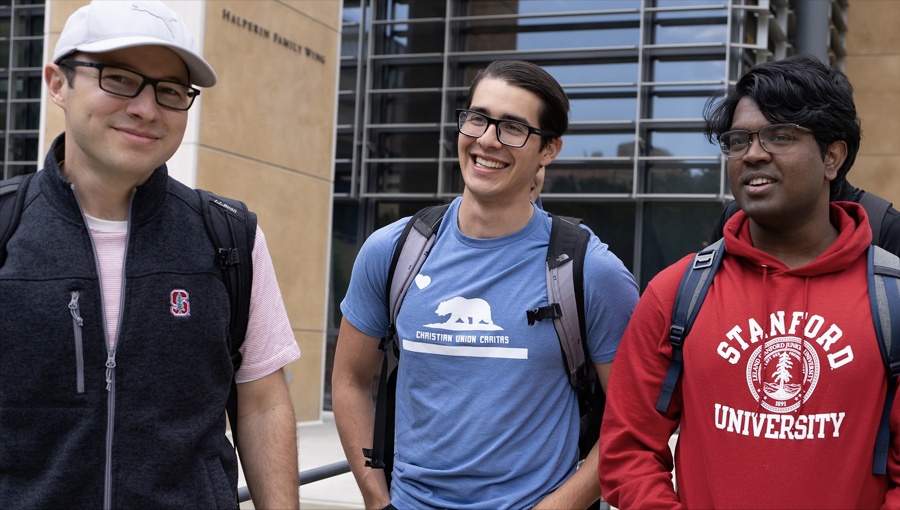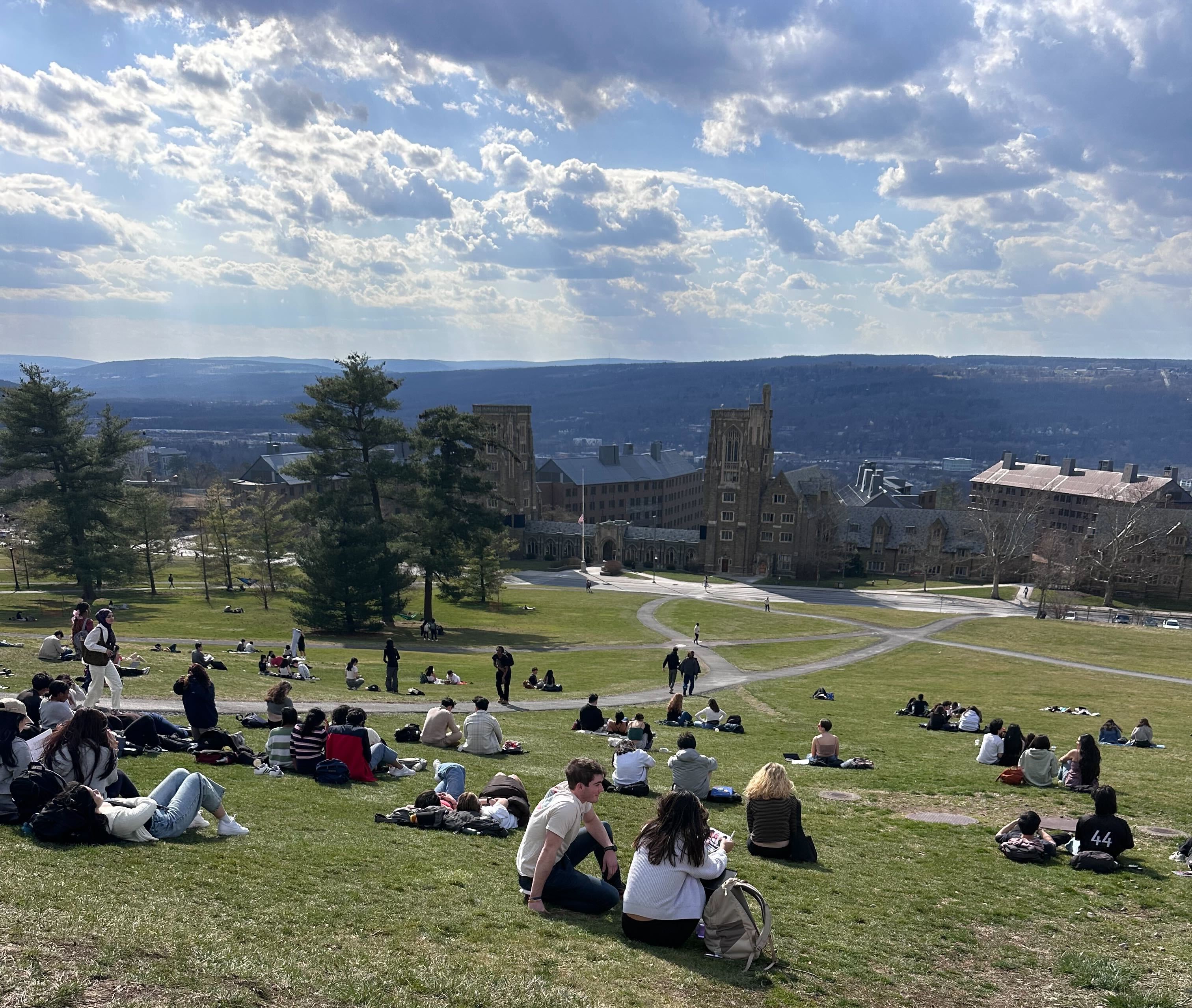Christian Union at Yale Hosts Forum
by cassandra hsiao, yale ’21
On a rainy Friday evening in April, a hundred people gathered in Battell Chapel at Yale University to hear the answer to the pressing question: “Why suffering?”
Christians and skeptics alike have grappled with this question for centuries—how could a loving God allow for the existence of suffering? At a forum hosted by Christian Union, Vince Vitale and Michael Suderman of the Ravi Zacharias Institute presented some profound answers.
Vitale, educated at Princeton (’04) and Oxford, is the director of the Zacharias Institute. Along with Suderman, he has been traveling across the country, giving lectures at churches and college campuses alike.

In a spring semester forum, Vince Vitale shared how intellectualism, compassion, and empathy all play roles in answering the question “Why Suffering?”
At Yale, Vitale started by recounting an anecdote about his cousin, whose physical disabilities have caused much suffering in the family. Vitale’s aunt once asked him the question “Why suffering?” He found that his abstract intellectual answers fell short. Vitale then realized that there was no one singular answer to this question, and pointed out to the audience that answers can come in many forms—including compassion and empathy, alongside intellectualism. He then stated that the points he was going to make would, in some small way, speak to an aspect of “why suffering.”
Vitale focused his presentation on four people in his life. One was a childhood friend to whom he wasn't very nice—an anecdote to demonstrate that suffering is often caused by mankind. Though God could have forced Vitale to be nicer, God would not be all-loving in taking away our free will.
Vitale’s second anecdote recounted the way his parents fell in love—and what a different person he might have been if his mother fell in love with somebody else. Vitale wanted to demonstrate how such small chance encounters could change the future, and then connected it to the problem of suffering. “Imagine how radically who comes to exist would change if God miraculously removed all vulnerability to suffering,” said Vitale. “I think one likely result is that none of us, or the people we love, would come to exist.”
His third point was about grace. It centered around his wife, and how Vitale felt neither deserved the other—and that was the beauty of marriage and relationships. “What if, in His grace, God wasn’t looking for someone perfect, but rather someone whom He could love? And what if, in His perfect grace, despite all our inadequacies and all our imperfections, He found himself with a love for us and a desire to create us?” asked Vitale.
Vitale’s last point included an anecdote about his mother and her sacrificial love toward him to demonstrate that God is not distant, but suffers right alongside us. “This is what Jesus did on the Cross,” said Vitale. “He loved us enough to step down into our suffering with us, even though that meant suffering at the hands of those He had created.”
In the second half of the forum, Suderman and Vitale fielded questions asked in person and through an online forum; questions about identity, existence, blame, free will, and favoritism emerged. In addition, Christian Union at Yale hosted a special session at its Pennington Center afterwards, a low-key mingle providing students a chance to get to know Vitale and Suderman more personally while munching on desserts. Students asked questions not only related to suffering, but also myriad other topics: the importance of intellectualism in Christianity, how best to observe the Sabbath, and personal growth as Christians. The conversation continued past 11 p.m., a testament to the level of engagement students had with the speakers.
For Vitale, giving a talk at Yale brings him full circle. It is always a joyful occasion to speak at Ivy League schools, he said. As an undergraduate at Princeton, Vitale was a skeptic until a friend took him to a similar forum. Six months later, he gave his life to Christ. “When I speak on an Ivy League campus in particular, I feel like I can see my former non-Christian self in the audience. It’s such a privilege to play a small part in some people’s journeys,” he said, reflecting on the event. “God was taking us all on a journey together.”
Indeed, for Jessica Kong ’21, the forum struck a chord. “I came in with a lot of skepticism, especially since the topic of suffering is something I’ve really been struggling with recently,” she said. Though she still has many pressing questions, she says she’s “still willing to pursue God and continue exploring this relationship with Him.”
Stanley Lam ’21 felt that the forum was a good reminder to stay intellectually hungry for God. “It’s easy for me to become complacent in my search for answers to these tough questions, and this talk was an encouragement to continue digging for answers,” said Lam.
The Q & A sessions were an opportunity not only to provide answers, but also to express the love of God. Suderman recounted times when people came forward to share their deeply painful sufferings. “There are things I have no words for on a fairly regular basis,” he said. At times, “I’m sitting there listening and I hardly say a word. Sometimes, that’s what people need—for you to be there,” said Suderman.
“[Sometimes] what they want is to express pain, or to share pain, or to have someone share their burden. Half of the battle to minister to someone, at the end of the day, is relating to them wherever they are.”
Clay Cromer, the director of Christian Union’s ministry at Yale, praised the thoughtfulness that flowed from Vitale and Suderman during the Q & A sessions. “This type of personal touch is critical, especially with a difficult subject like suffering. I’m confident that everyone who asked a question felt deeply heard, appreciated, respected, and honored,” said Cromer. “I think they were both ambassadors for the heart of God in how they answered questions, and if people left that night having experienced more of God’s heart for us in suffering, then that’s certainly positive.”












